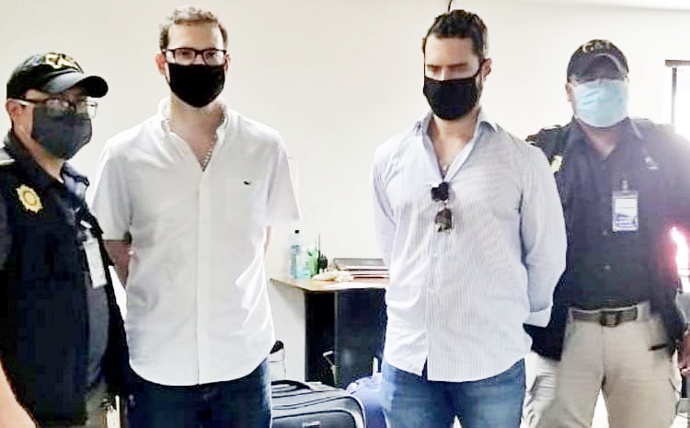Will the shedding of these parasites be part of Panama’s healing process? The extradition, trial, conviction and incarceration in the United States of the Martinelli Linares brothers would be a favor of sorts to Panama. But on the down side, we have just been taught a valuable but very painful lesson. Should we quickly unlearn it? We relied on Uncle Sam to rescue Panama again, but the United States can’t rescue itself at the moment, let alone Panama. The gringos aren’t this country’s salvation. Panamanians are. Photo by the Guatemalan National Civil Police.
A possible “new normal”
Panamanian independence
part 2 of 3, by Eric Jackson
The late Raúl Leis once said at a business leaders’ gathering that Panama is usefully seen as two countries, one that lives like Switzerland and the other that lives like Somalia. The polymath playwright / sociologist / educator / activist then became a symbol of what Panama when he died. It was an easily demonstrable wrong post-operative prescription for medication after minor eye surgery. As in medical malpractice provable and giving rise to compensation in almost every legal system in the world, but the way the Panamanian system the Leis family had no recourse.
In more recent news, President Cortizo says that he’s not negotiating with Carlos Slim’s construction company, FCC, over a deal about late charges and other sums owing with regard to a City of Health complex. That project was originally conceived as a center for medical tourism, where people from around the world, but particularly the ultra-expensive United States, would come for sundry health care services.
But not from the world’s top specialists. We’re a small country, so in almost any field the majority of the world’s best will not be Panamanian. In the event that a Panamanian rises to world renown in medicine or some other scientific field, usually she or he emigrates to a place where the pay is better and there is more respect for professionals.
But hey, that leaves plenty of work for the locals, writing doctors’ notes for criminal politicians to submit to overly tolerant judges to get their trials delayed.
Let me not pick on the doctors, especially not at this moment. I am, after all, the son of a mad doctor, expert in his field despite the substance abuse and madness. And I know Panama’s health professionals to be well educated and to practice at a generally high standard notwithstanding a lack of legal accountability. And I know that most of Panama’s health care professionals have made great efforts and great sacrifices during the current crisis. Some of them have given their lives in service of their patients. As an observer of politics and labor relations here, I also have to take notice of doctors, nurses, clinical psychologists and other health professionals perennially at the forefront of social justice and anti-corruption movements.
But monopollistic dibs, very real fears of insult or oppression, a political culture in which the first question is “How much do I get,” a snob culture in which the most expensive and allegedly prestigious brand is always the most appropriate technology and – voilla! An arguably reasonable national development project becomes an international shark feeding frenzy. SOMEBODY got something, but most Panamanians, in ways that we may not directly and clearly see, got to pay for it.
It’s not as if this way of doing business is a secret in the world. A lot of the most prestigious firms avoid doing business here because of it. A lot of the world’s top musicians won’t play Panama because of its reputation for sharp-dealing promoters. The top people in the licensed professions are by and large banned. Probably worst of all, our universities get hardly any international professors and, if you believe all those rankings that Latin American media love to publish, our schools languish at well below mediocre levels.
In any case, we don’t get much medical tourism – Havana, Tijuana and Medellin stomp all over us in that field – and when the pandemic hit we didn’t have a tourism-oriented City of Health to press into national service.
As these words are written Panama edges up toward 1,900 COVID-19 deaths, the economy is a shambles for most people and international economists are talking about a coming “lost decade” for Latin America’s prospects.
How bad is it for us? Consider that in July of 2019, as the Cortizo years were beginning, the top subject of business commentary was about who would eat the losses from unsold inventory – mostly real estate units, but inventories of many kinds. All those empty condo units in the money laundering towers. All those half empty shopping centers grabbing at each others’ tenants. Luxury items without enough upscale buyers. Merchandise piled up in the warehouses of a Colon Free Zone which, until Venezuela’s strangulation, Colombia’s import substitution policies and now a general regional economic decline, has been the main wholesaling and warehousing district for northern South America, the Caribbean and Central America.
Affordable housing, our own food, manufactured goods of any sort? Panama has for decades been producing ever less of that stuff.
The canal business? Yes, the ACP has jacked up tolls and reports record earnings. But notice that they have been looking at schemes to take over the ports, get into recreational investments, take over the nation’s water supply as a for-profit business. The canal will attract business as long as it operates, but its business outlook is a complex matrix. In 2006 we were told it wouldn’t happen, but already we lose business to Arctic routes. The foreseeable end of the fossil fuel economy changes our customer base and what the ships that pass through here buy. 3D printing changes not only the way things are made, but what they are made out of, the weight of these things and where they are made – all of which affect what the Panama Canal’s market will bear. The Nicaragua Canal isn’t happening, but railroads across South America and further up the Meso-American Isthmus probably will be and those will offer alternatives to the Panama Canal.
And then there is money laundering – ahem, “offshore asset protection.” The rest of the world, in many cases hypocritically so, is sick of it. The State of Delaware, the City of London and so on may be as bad or worse offenders, but the extreme concentration of wealth that has been globalization on corporate terms is politically unsustainable and so will be tax havens where the ultra-rich squirrel away their assets. (And yes, Uncle Sam defines “money laundering” as related to drugs, certain forms of graft and other rackets it doesn’t like, but not men defrauding ex-spouses in divorce settlements, nor the Trump gang’s post-prison expatriate living funds.)
Panama is just small enough to be picked upon and just brazen enough to provoke attention. Even our ship registry, also created to avoid taxes, unions and regulations, is fairly or unfairly the focus of international criticism of late. An economy based on impunity through anonymity, and law firms designing international chains of shell companies and numbered bank accounts can’t be sustained. For one thing, no matter what the cryptocurrency hustlers tell you the US National Security Agency is not the only entity in the world that’s capable of intercepting and decoding the electronic trails of financial transactions.
The money laundering economy is doomed. Not only by world demand, but because so few Panamanians share enough in its proceeds to defend it.
So where does Panama go after it crawls out of the pandemic hole? Don’t look to the political caste for salvation or even good ideas. Good thing that Panamanian society is fairly nonviolent, because those people are playing the same old games, the political parties are all discredited and anyone now standing in the wings represents a tiny social base. We could have a bloody revolution, but more likely, given our history, a police coup.
Whoever or whatever ends up on top, the way forward is for a country that produces things.
A country that grows our own food, with an agricultural export sector on the side, not at the center of Panamanian farming. Which harvests seafood from restored natural hatcheries like mangrove forests and coral reefs and from industrial hatcheries – fisheries that hire a lot of people to chase off poachers and let Panamanians bring in sustainable catches.
If we mine copper, some of what is dug up here gets processed in Panamanian foundries and factories into objects made out of copper.
The Chinese or the Americans or whoever want to locate factories here to make products destined for nearby markets? Fine, so long as it involves neither slavery, sweatshops nor poisoned communities.
And what else? All of the things you probably never thought of, from Panama’s largest productive sector, the informal economy. But let it become more formal and prosperous. Like by allowing people to register as doing business under an assumed name or as a sole proprietorship, without the lawyer and CPA bills of incorporation, without the bans on bank accounts and post office boxes.
Ah, but the “What’s my cut?” and “Who’s ever heard of YOUR family?” and “I’m tight with the functionary who can shut you down so I can take over” crowds stand in the way. Panama has little chance of a happy recovery from the current woes unless and until such obstructions are removed.
Contact us by email at fund4thepanamanews@gmail.com
To fend off hackers, organized trolls and other online vandalism, our website comments feature is switched off. Instead, come to our Facebook page to join in the discussion.
These links are interactive — click on the boxes












